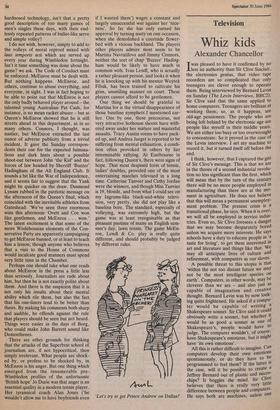Television
Whiz kids
Alexander Chancellor
T was pleased to have it confirmed by no 1.less an authority than Sir Clive Sinclair, the electronics genius, that video tape recorders are so complicated that only teenagers are clever enough to operate them. Being interviewed by Bernard Levin on Sunday (The Levin Interviews, BBC2), Sir Clive said that the same applied to home computers. Teenagers are brilliant at working them; so, as it happens, are old-age pensioners. The people who are being left behind by the electronic age are people like myself in their middle years. We are either too busy or too overwrought to concentrate. So it proved in the case of the Levin interview. I set my machine to record it, but it turned itself off before the end.
I think, however, that I captured the gist of Sir Clive's message. This is that we are in the throes of a second industrial revolu- tion no less significant than the first, which will mean that by the turn of the century' there will be no more people employed in manufacturing than there are at the mo- ment in agriculture. He does not believe that this will mean a permanent unemploy- ment problem. The present crisis is a transitional phase, he says. When it is over, we will all be employed in service indus- tries. Even so, Sir Clive foresees a danger that we may become desparately bored unless we acquire more interests. He says schools have a duty to educate people in 'a taste for living', to get them interested in art and literature and things like that. We may all anticipate lives of culture and refinement, with computers as our slaves. A possible threat to this utopia is that `within the not too distant future we maY not be the most intelligent species on earth'. Computers, in other words, may be cleverer than we are — and also just as capable of imagination and creative thought. Bernard Levin was by now look- ing quite frightened. He asked if a compu- ter would be capable of writing a Shakespeare sonnet. Sir Clive said it could obviously write a sonnet, but whether it would be as good a sonnet as one of Shakespeare's, people would have to judge. The computer wouldn't, of course, have Shakespeare's emotions, but it might have 'its own emotions'. All this is rather difficult to imagine. Can computers develop their own emotions spontaneously, or do they have to be programmed to feel them? If the latter is the case, will it be possible to create a Jeffrey Bernard out of plastic and micro- chips? It boggles the mind. Sir Clive believes that there is really very little difference between people and computers. He says both are machines, unless one believes — as he doesn't — that people have immortal souls. Sir Clive, with his bald head, spectacles, beard and piercing blue eyes, could have been chosen by Central Casting to play a sinister scientist bent on taking over the world. But he is a good interviewee — clear, articulate and honest in his answers — and I decided after a bit that one needn't feel too frightened by him.
The two-part Granada documentary Cyprus: Britain's Grim Legacy (ITV, Tues- day and Wednesday) was perhaps most remarkable for the portrait it gave us of the EOKA terrorists, now speaking freely for the camera about their crimes. There was one constantly smiling man who described how he felt when he was ordered to shoot a man for the first time. 'I pissed drop by drop in my underwear,' he said. But after that things got easier. 'After a lot of killing, You get used to killing.' A less sympathetic terrorist, a servant at Government House who in 1956 placed a bomb in the bed of the Governor, Sir John Harding, said he had planned for it to kill his wife as well `not to have her to cry after him, you know'. In the event, it didn't go off. But the EOKA movement, ruthlessly led by George Grivas, obviously attracted a lot of Perfectly nice young people who became Prepared to do anything in the nationalist cause. The programme showed how near Britain came to an agreement with Makar- Kis in 1956 and how, after the failure of those negotiations, things went progres- sively from bad to worse until the final, tragic partition of the island which we have today. Harold Macmillan said of Cyprus: It's the most baffling problem I can remember.' The British seem to have made their contribution to ensuring that the problem is permanently insoluble.















































 Previous page
Previous page